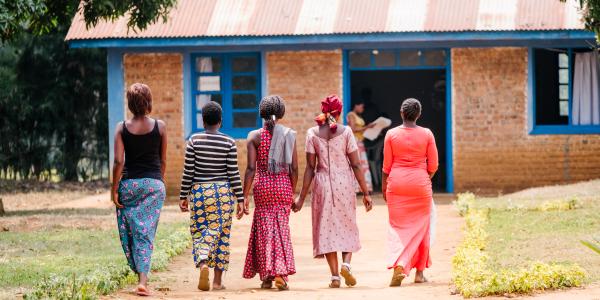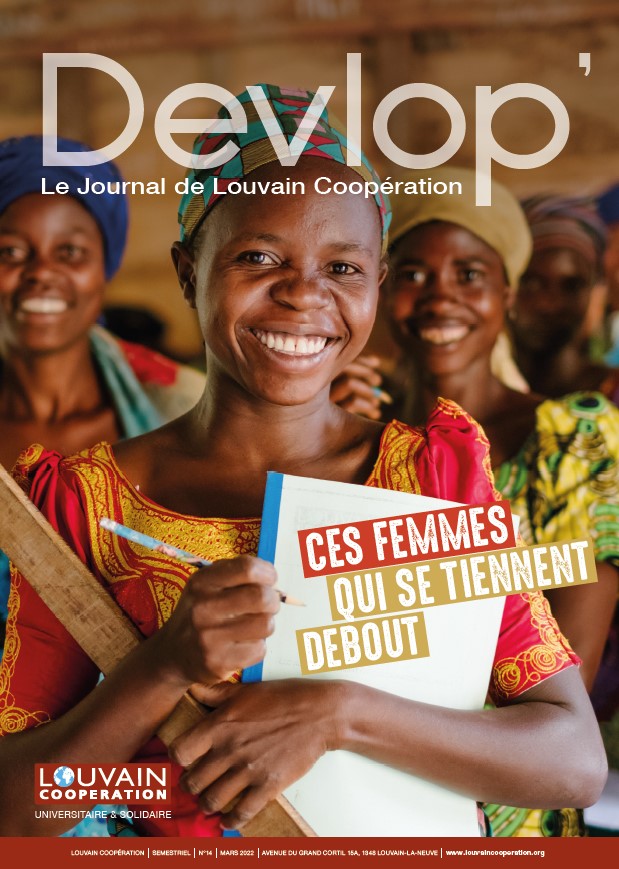
Edito
A cross-cutting and contextualised approach to gender
The gender approach in development is often confused with simply integrating women into projects, without rethinking power relations. Some even go so far as to justify this integration of women by the need to enhance the efficiency of projects, rather than on the principle of equal dignity between people. The gender approach also suffers from being considered a method, a ‘one-size-fits-all’ recipe for including both men and women in a development dynamic. As if the issue of gender were a methodology and one social context could be equivalent to another.
This is why Louvain Coopération has strived to develop a cross-cutting and contextualised approach to gender. First, it conducted a survey in all areas of intervention to identify practices and analyse the efforts made in previous programmes. This survey was supplemented by the work of interns and thesis students, as well as by exchanges within the Gender Learning Community. You will find out more about these topics in the following pages.
Louvain Coopération's gender approach is now based on the experiential and scientific knowledge of all the NGO's areas of intervention. While defending human rights, Louvain Coopération does not wish to transfer “recipes” from one region or country to another, as the socio-economic and political contexts of the regions in which it operates are not only frameworks for action, they also determine it.
Within our learning community, I have been looking more specifically at intersectionality (a concept aimed at revealing the plurality of discrimination) in gender-based violence. When it interacts with other forms of exclusion based on origin, socio-economic status, age, etc., the effects accumulate and shape their sense of power, resilience and position in social and economic life. Our programme to support healthcare systems in Bolivia therefore takes into account the many forms of marginalisation faced by women. It aims to improve the way services for preventing and responding to violence are organised.
We are also aiming for more profound changes by including boys and men in our programmes. Our work with the education system aims to deconstruct the stereotypes surrounding this issue and to co-construct new masculinities and femininities.
In Cambodia, women are supported to engage in sustainable agricultural practices and entrepreneurial activities. For example, after joining a savings group, they have access to more goods and services and can then take on a greater role within their families. Several women have even initiated their own women farmers' group to discuss community issues, but also health and wellbeing aspects.
Our programme also aims to improve access to comprehensive health services for non-communicable diseases, particularly mental health. As part of this, social workers train women to provide mental health education and referrals. They are seen as partners, serving as a link between their own community and the public health system. They also play an active role in health awareness campaigns, aimed at preventing diabetes and other non-communicable diseases.
Our gender approach sees women as human agents of change, through actions that give them greater control over their lives.
Louvain Coopération and its partners are implementing numerous actions aimed, directly or indirectly, at equality between women and men. At the dawn of our new five-year programme, it was essential to question the diversity of approaches chosen by these projects, their contextualisation, the methodologies used and, of course, the objectives of societal transformation targeted.
To achieve this, the members of our teams, both in the North and South, have come together in a learning community on the gender approach. This enables them to exchange knowledge and experience and create shared learning, in order to act with discernment, commitment and innovation.
In this Devlop' that puts the spotlight on women, let's give the floor to a few members of this community.
Every year, our team welcomes many interns, students and researchers who are interested in our projects. So it's only natural that we should call on this pool of motivation and knowledge to help us analyse and develop our approach to gender and our actions aimed specifically at women. Three students answered our call. They share their experiences with us.
Why did you choose to do your internship at LC?
I did a three-month placement at LC during my 3rd year of a Bachelors degree in International Cooperation (HEP Namur). I was interested in gender issues and women's empowerment, and it turned out that the NGO wanted to strengthen this aspect within its projects.
What was the purpose of your internship?
I worked on taking gender into account in the socio-professional integration of street children (ESDR) in Kinshasa (DRC). What did your research teach you? It showed that gender relations as understood and adopted in the West cannot be transposed as such to African societies because the realities are not the same. Taking gender into account in this project was superficial and encountered difficulties because societies are still strongly patriarchal. Women are relegated to the background in economic activities and/or directed towards precarious sectors, but they are also not always welcome in political and decision-making roles within society.
What do you think needs to be improved to ensure that the gender dimension is better taken into account?
Firstly, the social realities and gender representations prevailing in society must be taken into account. Then involve men more in awareness campaigns (positive masculinity), because involving them means making them aware of the importance of empowering women and the positive repercussions for society in general and for couples in particular. To make them understand that this is not a war between women and men, but rather a struggle for better living conditions, regardless of gender. And finally, to get the State (lobbies) to put in place policies in favour of free education and the inclusion of all sections of society in order to put an end to the inequalities in access to education that penalise girls.
Aminata Cissé,
Master's student in political science
in international relations at the University
Sorbonne Paris Nord (France).
Receive
the full version
of the Devlop' newsletter


